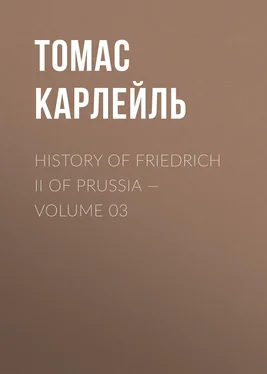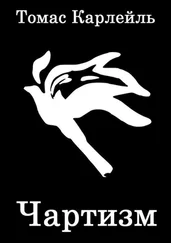Томас Карлейль - History of Friedrich II of Prussia — Volume 03
Здесь есть возможность читать онлайн «Томас Карлейль - History of Friedrich II of Prussia — Volume 03» — ознакомительный отрывок электронной книги совершенно бесплатно, а после прочтения отрывка купить полную версию. В некоторых случаях можно слушать аудио, скачать через торрент в формате fb2 и присутствует краткое содержание. Жанр: foreign_prose, История, literature_19, foreign_edu, foreign_antique, на английском языке. Описание произведения, (предисловие) а так же отзывы посетителей доступны на портале библиотеки ЛибКат.
- Название:History of Friedrich II of Prussia — Volume 03
- Автор:
- Жанр:
- Год:неизвестен
- ISBN:нет данных
- Рейтинг книги:5 / 5. Голосов: 1
-
Избранное:Добавить в избранное
- Отзывы:
-
Ваша оценка:
- 100
- 1
- 2
- 3
- 4
- 5
History of Friedrich II of Prussia — Volume 03: краткое содержание, описание и аннотация
Предлагаем к чтению аннотацию, описание, краткое содержание или предисловие (зависит от того, что написал сам автор книги «History of Friedrich II of Prussia — Volume 03»). Если вы не нашли необходимую информацию о книге — напишите в комментариях, мы постараемся отыскать её.
History of Friedrich II of Prussia — Volume 03 — читать онлайн ознакомительный отрывок
Ниже представлен текст книги, разбитый по страницам. Система сохранения места последней прочитанной страницы, позволяет с удобством читать онлайн бесплатно книгу «History of Friedrich II of Prussia — Volume 03», без необходимости каждый раз заново искать на чём Вы остановились. Поставьте закладку, и сможете в любой момент перейти на страницу, на которой закончили чтение.
Интервал:
Закладка:
THE ELDER LINE OF CULMBACH: FRIEDRICH AND HIS THREE NOTABLE SONS THERE
Kurfurst Albert Achilles's second son, Friedrich (1460-1536), [Rentsch, pp. 593-602.] the founder of the Elder Culmbach Line, ruled his country well for certain years, and was "a man famed for strength of body and mind;" but claims little notice from us, except for the sons he had. A quiet, commendable, honorable man,—with a certain pathetic dignity, visible even in the eclipsed state he sank into. Poor old gentleman, after grand enough feats in war and peace, he fell melancholy, fell imbecile, blind, soon after middle life; and continued so for twenty years, till he died. During which dark state, say the old Books, it was a pleasure to see with what attention his Sons treated him, and how reverently the eldest always led him out to dinner. [Ib. p. 612.] They live and dine at that high Castle of Plassenburg, where old Friedrich can behold the Red or White Mayn no more. Alas, alas, Plassenburg is now a Correction-House, where male and female scoundrels do beating of hemp; and pious Friedrich, like eloquent Johann, has become a forgotten object. He was of the German Reichs-Array, who marched to the Netherlands to deliver Max from durance; Max, the King of the Romans, whom, for all his luck, the mutinous Flemings had put under lock-and-key at one time. [1482 (Pauli, ii. 389): his beautiful young Wife, "thrown from her horse," had perished in a thrice-tragic way, short while before; and the Seventeen Provinces were unruly under the guardianship of Max.] That is his one feat memorable to me at present.
He was Johann Cicero's HALF-brother, child by a second wife. Like his Uncle Kurfurst Friedrich II., he had married a Polish Princess; the sharp Achilles having perhaps an eye to crowns in that direction, during that Hungarian-Bohemian-Polish Donnybrook. But if so, there again came nothing of a crown with it; though it was not without its good results for Friedrich's children by and by.
He had eight Sons that reached manhood; five or six of whom came to something considerable in the world, and Three are memorable down to this day. One of his daughters he married to the Duke of Liegnitz in Silesia; which is among the first links I notice of a connection that grew strong with that sovereign Duchy, and is worth remarking by my readers here. Of the Three notable Sons it is necessary that we say something. Casimir, George, Albert are the names of these Three.
Casimir, the eldest, [1481-1527.] whose share of heritage is Baireuth, was originally intended for the Church; but inclining rather to secular and military things, or his prospects of promotion altering, he early quitted that; and took vigorously to the career of arms and business. A truculent-looking Herr, with thoughtful eyes, and hanging under-lip:—HAT of enviable softness; loose disk of felt flung carelessly on, almost like a nightcap artificially extended, so admirably soft;—and the look of the man Casimir, between his cataract of black beard and this semi-nightcap, is carelessly truculent. He had much fighting with the Nurnbergers and others; laid it right terribly on, in the way of strokes, when needful. He was especially truculent upon the Revolt of Peasants in their BAUERNKRIEG (1525). Them in their wildest rage he fronted; he, that others might rally to him: "Unhappy mortals, will you shake the world to pieces, then, because you have much to complain of?" and hanged the ringleaders of them literally by the dozen, when quelled and captured. A severe, rather truculent Herr. His brother George, who had Anspach for heritage, and a right to half those prisoners, admonished and forgave his half; and pleaded hard with Casimir for mercy to the others, in a fine Letter still extant; [In Rentsch, p. 627.] which produced no effect on Casimir. For the dog's sake, and for all sakes, "let not the dog learn to eat LEATHER;" (of which his indispensable leashes and muzzles are made)! That was a proverb often heard on the occasion, in Luther's mouth among the rest.
Casimir died in 1527, age then towards fifty. For the last dozen years or so, when the Father's malady became hopeless, he had governed Culmbach, both parts of it; the Anspach part, which belonged to his next brother George, going naturally, in almost all things, along with Baireuth; and George, who was commonly absent, not interfering, except on important occasions. Casimir left one little Boy, age then only six, name Albert; to whom George, henceforth practical sovereign of Culmbach, as his Brother had been, was appointed Guardian. This youth, very full of fire, wildfire too much of it, exploded dreadfully on Germany by and by (Albert ALCIBIADES the name they gave him); nay, towards the end of his nonage, he had been rather sputtery upon his Uncle, the excellent Guardian who had charge of him.
FRIEDRICH'S SECOND SON, MARGRAF GEORGE OF ANSPACH
Uncle George of Anspach, Casimir's next Brother, had always been of a peaceabler disposition than Casimir; not indeed without heat of temper, and sufficient vivacity of every kind. As a youth, he had aided Kaiser Max in two of his petty wars; but was always rather given "to reading Latin," to Learning, and ingenious pursuits. His Polish Mother, who, we perceive, had given "Casimir" his name, proved much more important to George. At an early age he went to his Uncle Vladislaus, King of Hungary and Bohemia: for—Alas, after all, we shall have to cast a glance into that unbeautiful Hungarian-Bohemian scramble, comparable to an "Irish Donnybrook," where Albert Achilles long walked as Chief-Constable. It behooves us, after all, to point out some of the tallest heads in it; and whitherward, bludgeon in hand, they seem to be swaying and struggling.—Courage, patient reader!
George, then, at an early age went to his Uncle Vladislaus, King of Hungary and Bohemia: for George's Mother, as we know, was of royal kin; daughter of the Polish King, Casimir IV. (late mauler of the Teutsch Ritters); which circumstance had results for George and us. Daughter of Casimir IV. the Lady was; and therefore of the Jagellon blood by her father, which amounts to little; but by her mother she was Granddaughter of that Kaiser Albert II. who "got Three Crowns in one year, and died the next;" whose posterity have ever since,—up to the lips in trouble with their confused competitive accompaniments, Hunniades, Corvinus, George Podiebrad and others, not to speak of dragon Turks coiling ever closer round you on the frontier,—been Kings of Hungary and Bohemia; TWO of the crowns (the HERITABLE two) which were got by Kaiser Albert in that memorable year. He got them, as the reader may remember, by having the daughter of Kaiser Sigismund to wife,—Sigismund SUPER-GRAMMATICAM, whom we left standing, red as a flamingo, in the market-place of Constance a hundred years ago. Thus Time rolls on in its many-colored manner, edacious and feracious.
It is in this way that George's Uncle, Vladislaus, Albert's daughter's son, is now King of Hungary and Bohemia: the last King Vladislaus they had; and the last King but one, of any kind, as we shall see anon. Vladislaus was heir of Poland too, could he have managed to get it; but he gave up that to his brother, to various younger brothers in succession; having his hands full with the Hungarian and Bohemian difficulty. He was very fond of Nephew George; well recognizing the ingenuous, wise and loyal nature of the young man. He appointed George tutor of his poor son Ludwig; whom he left at the early age of ten, in an evil world, and evil position there. "Born without Skin," they say, that is, born in the seventh month;—called Ludwig OHNE HAUT (Ludwig NO-Skin), on that account. Born certainly, I can perceive, rather thin of skin; and he would have needed one of a rhinoceros thickness!
George did his function honestly, and with success: Ludwig grew up a gallant, airy, brisk young King, in spite of difficulties, constitutional and other; got a Sister of the great Kaiser Karl V. to wife;—determined (A.D. 1526) to have a stroke at the Turk dragon; which, was coiling round his frontier, and spitting fire at an intolerable rate. Ludwig, a fine young man of twenty, marched away with much Hungarian chivalry, right for the Turk (Summer 1526); George meanwhile going busily to Bohemia, and there with all his strength levying troops for reinforcement. Ludwig fought and fenced, for some time, with the Turk outskirts; came at last to a furious general battle with the Turk (29th August, 1526), at a place called Mohacz, far east in the flats of the Lower Donau; and was there tragically beaten and ended. Seeing the Battle gone, and his chivalry all in flight, Ludwig too had to fly; galloping for life, he came upon bog which proved bottomless, as good as bottomless; and Ludwig, horse and man, vanished in it straightway from this world. Hapless young man, like a flash of lightning suddenly going down there—and the Hungarian Sovereignty along with him. For Hungary is part of Austria ever since; having, with Bohemia, fallen to Karl V.'s Brother Ferdinand, as now the nearest convenient heir of Albert with his Three Crowns. Up to the lips in difficulties to this day!—
Читать дальшеИнтервал:
Закладка:
Похожие книги на «History of Friedrich II of Prussia — Volume 03»
Представляем Вашему вниманию похожие книги на «History of Friedrich II of Prussia — Volume 03» списком для выбора. Мы отобрали схожую по названию и смыслу литературу в надежде предоставить читателям больше вариантов отыскать новые, интересные, ещё непрочитанные произведения.
Обсуждение, отзывы о книге «History of Friedrich II of Prussia — Volume 03» и просто собственные мнения читателей. Оставьте ваши комментарии, напишите, что Вы думаете о произведении, его смысле или главных героях. Укажите что конкретно понравилось, а что нет, и почему Вы так считаете.









